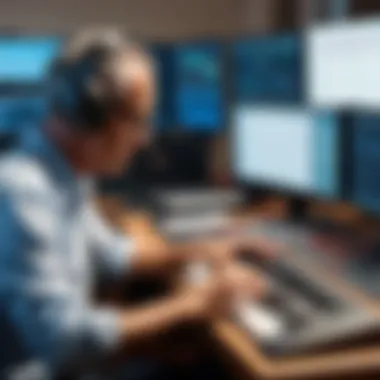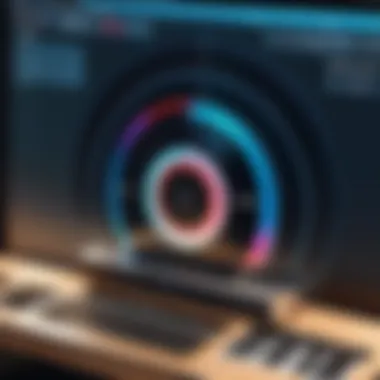An In-Depth Analysis of The Bosch Soundtrack


Intro
The intricate relationship between music and narrative in television series has gained increased attention in recent years. In Bosch, a gripping crime drama, the soundtrack plays a vital role in creating atmosphere and enhancing the storytelling process. This analysis aims to examine how the orchestration of sounds, song choices, and overall sound design intertwine to influence the viewer's experience.
In this article, we will explore various aspects of the Bosch soundtrack, including the thematic significance of the music, the selection process for tracks, and insights into the composers who brought the audio landscape to life. We will also consider the broader implications of music in storytelling, particularly in the crime drama genre. Through this in-depth exploration, readers will gain a comprehensive understanding of how sound influences narratives and shapes audience engagement.
By investigating the layers of audio elements within Bosch, we can better appreciate the complexities involved in crafting compelling television that resonates on multiple levels. The analysis will cover not just the music itself but also how it serves as a character in the series, providing depth and emotional context.
As we embark on this journey, we hope to uncover the nuances that contribute to the soundtrack's success and its role in elevating the overall viewing experience.
Intro to Bosch Soundtrack
In a television series, sound is often as vital as the narrative itself. It shapes emotions, reinforces themes, and guides the viewer's journey. Bosch, a crime drama based on Michael Connelly's novels, exemplifies this. The soundtrack is far more than an accessory; it forms an integral part of the storytelling process. This section explores why understanding the Bosch soundtrack is crucial for appreciating the series holistically.
Overview of Bosch Series
Bosch follows LAPD detective Harry Bosch as he navigates complex investigations while dealing with his own moral dilemmas. The show is set against the backdrop of Los Angeles, a city that plays a significant role in shaping its atmosphere. Each episode intertwines Bosch's personal and professional challenges, engaging the audience not only with thrilling plots but also with the emotional weight carried through its musical score. The characters' motivations and conflicts are often mirrored in the soundtrack, making music a silent yet powerful participant in the narrative.
The show’s ability to blend reality and fiction is notable. It captures the nuances of life in Los Angeles while presenting a gritty yet captivating representation of crime and justice. An understanding of the series' complexities cannot be fully appreciated without examining how these elements interact with music.
Importance of Soundtracks in Television
Soundtracks play a significant role in framing the viewer's experience of a television series. They serve multiple purposes, from enhancing the emotional impact to establishing a specific tone. A well-crafted soundtrack can linger in the viewer's mind long after the credits roll.
Here are some important aspects of soundtracks in television:
- Emotional Resonance: Music can amplify feelings, guiding how the audience should react to certain scenes.
- Narrative Support: The right track can provide context, enriching the storyline and aiding character development.
- Atmospheric Context: A carefully curated soundtrack creates a unique atmosphere that immerses viewers in the world portrayed.
- Cultural Reflection: Soundtracks often reflect the cultural setting, capturing the essence of the location and time the narrative unfolds.
The significance of a thoughtful soundtrack in series such as Bosch cannot be overstated; it often transcends mere background noise to become a character of its own.
In Bosch, the soundtrack mirrors the gritty realism of the story while establishing a connection between the audience and the urban landscape depicted. As we delve deeper into the various aspects of the Bosch soundtrack, we will explore how music interacts with the series' compelling narrative.
The Role of Music in Bosch
Music in the series Bosch serves crucial functions that deepen the narrative experience. The role it plays extends far beyond mere background score or filler. Instead, it is intricately woven into the fabric of storytelling, enhancing both emotional resonance and narrative clarity. This section elaborates on specific elements where music profoundly affects viewer engagement and comprehension, bringing forth benefits that align music with character arcs and plot developments.
Enhancing Narrative Through Music
Soundtrack plays an active role in advancing the plot within Bosch. Specific musical cues coincide with significant moments, guiding viewer emotions and highlighting critical changes in tension or mood. For instance, as Bosch faces moral dilemmas, the musical score shifts to reflect his inner struggle, reinforcing the viewer's emotional investment in his journey. Through strategic placement, music creates seamless transitions between scenes, smoothing the flow of narrative and allowing for a more immersive viewing experience.
In particular, the series employs a blend of moody, atmospheric sounds with more dominating musical pieces to emphasize climactic moments. The composers, recognize that silence punctuated by powerful music can evoke stronger feelings. Thus, sounds act as catalysts propelling the story forward, subtly suggesting what is to come or giving hints about character intentions.
The score in Bosch is not just an accompaniment; it forms a vital part of the narrative architecture.
Creating Atmosphere and Mood
Ambient music in Bosch works hand in hand with the series’ visual elements to forge a specific atmosphere. The soundtrack reflects the gritty, complex world of Los Angeles which serves as both a backdrop and a character in its own right. Music choices range from jazz to rock, echoing the diverse sounds of the city, and they often define the mood of particular scenes.


Acoustic variations can convey feelings of isolation, danger, or urgency, aligning with the emotional states presented on screen. Furthermore, when moments of intensity appear, sharp crescendos and syncopated rhythms can heighten anticipation, pulling viewers along the edge of their seats. It reveals the influence of location and environment on narrative tone and character behavior, immersing the audience into the essence of Bosch's investigations.
In addition, close attention to sound design complements the visuals, ensuring that every element from city sounds to character interactions feels cohesive. This careful crafting highlights the importance of creating an engaging world, connecting viewers with the protagonist's journey not just through visuals, but also through auditory experiences.
In summary, music in Bosch is not merely aesthetic but a purposeful tool used to enhance narrative depth and emotional impact.
Notable Composers and Artists
The contribution of notable composers and artists plays a crucial role in shaping the musical landscape of the 'Bosch' soundtrack. Their work not only provides the auditory backdrop essential to the series but also enriches the narrative, enhancing the viewer's connection to the story and its characters. Exploring this aspect allows for a deeper understanding of how music functions as a storytelling device.
Primary Composer Contributions
The primary composer for 'Bosch' is the talented Marcelo Zarvos. His work is foundational to the score, where he brings a unique style that combines orchestral elements with urban soundscapes. Zarvos's music sets a tone that reflects both the gritty reality of Los Angeles and the internal struggles of Harry Bosch, the protagonist.
Zarvos often draws on minimalist techniques, creating motifs that are simple yet highly evocative. This choice not only underscores key scenes but also allows for greater emotional impact. Specific pieces, like the main theme, encapsulate Bosch's essence—resilience coupled with a sense of isolation.
A significant benefit of having a dedicated composer like Zarvos is consistency. His understanding of the characters and plot progression enables him to craft themes that evolve in tandem with Bosch's journey. This careful alignment of music and narrative ensures a cohesive viewer experience.
Guest Artists and Their Impact
In addition to Marcelo Zarvos, 'Bosch' benefits from the contributions of various guest artists whose work diversifies the soundtrack. These artists introduce distinct sounds and styles that further deepen the narrative texture.
For instance, Kurt Vile features some of his work, which adds a contemporary and almost reflective quality to certain moments. His tracks often punctuate scenes that delve into Bosch's personal life, providing a counterbalance to the series' more intense action sequences.
Guest artists also enable the soundtrack to resonate with a broader audience. By incorporating diverse genres, the show appeals to viewers with varied musical tastes. This fusion of styles contributes to the cultural identity of the series, establishing connections to both the urban landscape of Los Angeles and the broader themes explored in the narrative.
“The music in 'Bosch' is not just a background element; it drives the story forward and shapes the emotional landscape of each episode.”
In summary, the blend of primary composer Marcelo Zarvos’s consistent thematic work and the innovative contributions from guest artists creates a multi-dimensional soundtrack. This, in turn, enriches the overall storytelling of 'Bosch', making it a pivotal element of the series.
Critical Reception of the Soundtrack
Understanding the critical reception of the soundtrack in "Bosch" is pivotal for appreciating its impact on the overall series. This aspect reflects not only the audience's reception but also the critical evaluation of music's integration within the narrative structure. Positive responses can validate the effectiveness of musical choices and signal successful storytelling techniques. Conversely, critiques can provide insights into areas of improvement or shifts in tonal direction that might affect viewer engagement.
The importance of this section also lies in its ability to showcase how soundtracks can elevate productions and resonate with audiences beyond just the visual elements. Music serves as an emotional undercurrent that helps shape viewers' perceptions and interpretations of the storyline. By analyzing viewer feedback and expert critiques, we can recognize the intricate relationship between a show's music and its narrative depth.
Viewer Responses and Critiques
The viewer responses to the "Bosch" soundtrack have generally been favorable, with many praising the selection of tracks and the skillful handling of themes. Fans of the series frequently comment on how music accentuates moments of tension and drama. Audience forums and reviews have highlighted tracks that particularly emphasize the gritty atmosphere of Los Angeles, drawing on the urban landscape's unique sounds.
Many viewers appreciate how the blend of orchestral scores with contemporary tracks complements the mood. Online discussions often reflect the emotional connections viewers feel towards specific pieces, suggesting that music does more than just accompany visuals; it becomes part of the viewing experience.
However, critiques also emerge, focusing on instances where certain musical choices may seem jarring or out of place. These discussions reveal an audience that is not only engaged but critically aware, reflecting a deeper understanding of how music influences narrative flow. Certain viewers argue that, at times, the score could overshadow dialogue, suggesting a balance is essential for optimal storytelling. Such critiques can be constructive. They provide feedback for future soundtracks, offering potential adjustments in volume or selection choices to enhance clarity without sacrificing mood.
Awards and Recognitions
The soundtrack of "Bosch" has received recognition, showcasing the value of music in television production. While specific awards are more frequently attributed to overall series accolades, the soundtrack contributes notably to these successes. Key elements of the music have been acknowledged in various music and television awards.
The series has been nominated for awards that celebrate musical composition or sound design. For example, the American Society of Composers, Authors and Publishers (ASCAP) has honored music from shows that significantly impact storytelling, including works similar to "Bosch."


These recognitions are important for validating the contributions of composers and their role in shaping the soundscape of a popular series.
- Key Awards:
- Bennet Awards for excellence in music composition
- Soundtrack of the Year nominations at various film festivals
Overall, the accolades received serve as evidence of the careful consideration and creative effort behind the music in "Bosch." This assistance illustrates the broader acknowledgment of soundtracks as an integral part of cinematic storytelling.
Musical Themes and Concepts
The soundtrack of Bosch is not just an assortment of songs and scores; it embodies musical themes and concepts that elevate the storytelling. Music enhances not only emotional reactions but also supports character arcs and plot developments. It reflects the nuances of the narrative, guiding the audience through various moods and tensions inherent in the crime drama genre. Understanding these themes is essential to appreciate the full breadth of the series.
Recurring Musical Motifs
Recurring musical motifs create a sense of continuity throughout the series. These motifs often represent characters, locations, or specific emotional states. For instance, the use of a particular instrumental piece may accompany detective Bosch during moments of introspection or investigation. This strategy enables viewers to form connections between music and critical plot elements, reinforcing emotional resonance.
The motifs allow audiences to experience familiarity with characters and their journeys. Each time a motif reappears, it evokes memories of past events and feelings. This connection enriches the viewing experience, inviting deeper engagement and reflection. Sound designers carefully craft these motifs to be subtle yet impactful, ensuring they integrate seamlessly with the visuals.
Thematic Variations by Season
As the seasons of Bosch progress, the music evolves to mirror character development and story arcs. Each season introduces thematic variations that align with the shifting tone of the narrative. For example, earlier seasons might adopt a more intense and chaotic score, reflecting Bosch's challenges and conflicts. In contrast, later seasons may incorporate more subdued tones, illustrating a transition toward resolution and change.
Such variations highlight the dynamics within the storyline. They guide the audience through Bosch's transformations and symbolize themes such as justice, power, and redemption. This strategic approach to music selection creates a layered experience for viewers, where sound not only accompanies the visuals but also narrates its own story. Understanding these thematic variations reveals the true artistry behind the Bosch soundtrack.
Impact on Storytelling
Music in a series like Bosch does not operate in isolation. It deeply intertwines with storytelling, enhancing the narrative well beyond mere background noise. This section delves into the consequences of music on the viewer's understanding of characters, plot, and overall engagement with the show.
Character Development Through Sound
The soundtrack plays a pivotal role in character development within Bosch. Each character is presented not just through dialogue and actions but also through the music that accompanies their journey. The variations in track selection for different characters provide a nuanced understanding of their motivations and personality traits. For example, Harry Bosch, as a detective, often has somber and reflective music accompanying his scenes. This choice mirrors his introspective nature and the moral ambiguities he faces, allowing viewers to identify more closely with his struggles.
Moreover, the use of specific musical themes tied to characters creates a form of auditory shorthand. When familiar notes or phrases recur during critical moments, they can evoke strong emotions, reminding the audience of previous scenarios involving those characters. This technique deepens the emotional stakes, helping viewers connect on a more profound level than visual storytelling alone could achieve.
Pacing and Tension Building
The pacing of Bosch is often dictated by musical cues, which strategically build tension throughout episodes. Fast-paced music can escalate the urgency, making viewers feel the pressure during chase scenes or confrontations. On the other hand, slower tempo tracks might underscore moments of reflection or the aftermath of violence, offering a brief respite before the next wave of tension hits.
The careful orchestration of music to match the rhythmic flow of scenes is critical. Music can guide viewers on how to feel and react to unfolding events. This tendency to manipulate pacing through sound can lead to anxiety and anticipation, keeping the audience engaged. A well-timed strike of a score can signal impending danger, pushing viewers to brace themselves while watching.
The Use of Contemporary Music
Contemporary music plays a critical role in the Bosch soundtrack, enriching the series' narrative and enhancing the audience's viewing experience. This approach to music selection ensures that the series resonates with modern themes while remaining authentic to its crime drama roots. The integration of contemporary tracks offers not only entertainment but also helps to define characters and set the tone for various scenes throughout the series.
Integration of Modern Tracks
The choice of modern tracks in Bosch aids in establishing a connection between the audience and the characters. These tracks are carefully selected to mirror the emotional landscape of the story. For instance, a gritty chase scene might be underscored by a high-energy song that heightens tension and urgency.


Several notable tracks have been used in the series that are reflective of the contemporary urban environment of Los Angeles. This inclusion fosters a sense of realism that immerses the viewer into the narrative world.
- Examples of modern tracks:
- Song Title 1 by Artist A
- Song Title 2 by Artist B
Moreover, by featuring artists who are currently popular, the series attracts a younger demographic. This strategy not only amplifies the drama but also invites spontaneous discussions among viewers and fans through various online platforms, like Reddit and Facebook.
Influence of Genre on Music Selection
The genre of crime drama significantly influences the music selection for Bosch. Given the series' focus on law enforcement and morally complex characters, the soundtrack often reflects themes of struggle, intensity, and perseverance. Contemporary tracks that embrace these sentiments are thoughtfully integrated into the storyline.
The selection is also informed by the broader climate of crime dramas in media today. Many contemporary artists address themes of social justice, existential crises, or urban life that align with the series' narrative arcs. As a result, the music not only supports the storyline but also serves as a commentary on contemporary issues.
"Music is not just a backdrop but a vital element that complements the storytelling process."
By understanding the synergy of music and narrative in Bosch, one can appreciate how contemporary music does not merely serve as entertainment but enhances storytelling, solidifying its impact on both the series and its audience.
Soundtrack as Part of Cultural Identity
The soundtrack of any television series does more than just complement the action on screen; it becomes a vital aspect of its cultural identity. In the case of 'Bosch', this concept is particularly pronounced. The music selection, both original compositions and modern tracks, serves not only as an auditory backdrop but also as a narrative thread that connects the viewer to the show's setting and themes. The significance of the soundtrack transcends mere entertainment. It reflects cultural realities, social issues, and local nuances, making it integral to the overall storytelling experience.
Reflection of Urban Themes
Urban themes permeate 'Bosch' and are powerfully mirrored through its soundtrack. The series is set in Los Angeles, a city known for its diverse culture and complex social dynamics. The choice of music often highlights lifestyle contrasts and societal concerns prevalent in urban areas. For instance, jazz and blues elements featured in various scenes evoke a sense of the city’s rich cultural fabric, reminding viewers of both its vibrancy and difficulties.
This layering of sound enhances the narrative by embedding these urban themes within the viewer’s experience. It prompts reflection on issues like crime, justice, and community. Thus, the soundtrack acts as a storyteller in its own right, framing the narrative around the realities of urban life, allowing for a deeper connection with the characters and their motivations.
Connection with Los Angeles Soundscapes
Furthermore, the soundtrack draws directly from the soundscapes of Los Angeles, an essential component of the series' identity. Local artists and specific genres representative of the city create a palpable sense of place. For example, using contemporary rock and hip-hop tracks not only situates the story in a specific cultural moment but also resonates with the experiences of the characters who navigate this complex environment.
"The music serves as a bridge, linking personal stories with the broader urban narrative of Los Angeles."
Through this connection, viewers obtain not just an auditory experience but a representation of Los Angeles itself, enhancing both authenticity and engagement with the storyline. The urban sounds become synonymous with the city’s identity, allowing the audience to appreciate the intricate layers of its culture. Understanding this connection enriches the viewing experience and positions 'Bosch's' soundtrack as a vital element of its cultural commentary.
Future of the Bosch Soundtrack
The evolution of the Bosch soundtrack is a compelling topic worth exploring. As the series progresses, the music must adapt to the characters and their changing circumstances. This adaptability can influence viewer engagement and retention, thus shaping the series' overall success. Insights into future music choices will allow fans to appreciate the intricate relationship between sound and storytelling.
Further developments in the soundtrack will likely reflect emerging trends in both the music industry and television landscape. Music not only serves as a backdrop but also strengthens emotional connections with characters, enhancing the narrative.
Potential Developments in Upcoming Seasons
As Bosch continues to unfold, the potential for new musical developments exists. Expect a deeper exploration of character themes, where motifs might evolve to represent their arcs. This could lead to
- Innovative arrangements and orchestrations
- The inclusion of more modern genres, reflecting changes in popular culture
- Collaborations with new composers who bring fresh perspectives
New narrative elements could drive these changes, inviting composers to push creative boundaries. Fans will likely explore how these choices reflect character growth or shifts in tone.
Evolving Trends in Television Music
The trend in television music has often included the integration of diverse genres. Incorporation of hip-hop, electronic, or indie tracks in dramas creates depth, fostering unique atmospheres. As streaming platforms gain prominence, they influence music selection and the kind of artists featured.
The soundtracks are evolving to not only support the story but to become elements in themselves. Viewers now often analyze the music just as they do plot points. This cultural shift means that the Bosch soundtrack may adopt aspects such as:
- Utilization of specific cultural references through music
- Diversity in musical styles to reach wider audiences
- Trends that reflect societal changes and relevant issues
In summary, the future of the Bosch soundtrack holds potential for rich developments. The movement of music will continue to play a vital role in enriching the narrative and echoing audience sentiments.







